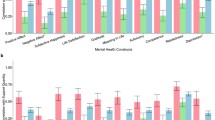Abstract
The physical and psychological correlates and consequences of social support have received much attention in the past decade. To date, however, much research on social support has not been guided by an integrated theoretical or conceptual framework. In this report, a life span developmental perspective is suggested for the study of social support. The discussion addresses numerous conceptual, theoretical, and empirical concerns related to the investigation of support. Implications for designing, implementing, and evaluating support-related interventions are highlighted.
Similar content being viewed by others
References
Cohen S, Syme SL:Social support and health. Orlando, Florida: Academic Press, 1985.
D'Augelli A: Social support networks in mental health. In JK Whittaker, & J Garbarino (Eds.),Social support networks: Informal helping in the human services. New York: Aldine, 1983.
Gottlieb BH: Social networks and social support: An overview of research practice, and policy implications.Health Ed Quarterly 12:5–22, 1985.
Heller K: The effects of social support: Prevention and treatment implications. In AP Goldstein & FH Kanfer (Eds.)Maximizing treatment gains: Transfer enhancement in psychotherapy. New York: Academic Press, 1979.
Heller K, Swindle RW: Social networks, perceived social support, and coping with stress. In RD Felner, LA Jason, J Moritsugu & SS Farber (Eds.)Preventive psychology: Theory, research, and practice in community intervention. New York: Pergamon Press, 1983.
Leavy RL: Social support and psychological disorder: A review.Journal of Comm Psych 11:3–21, 1983.
Lieberman MA: The effects of social supports on responses to stress. In L Goldberger & S Breznitz (Eds.),Handbook of stress. New York: Free Press, 1983.
Mitchell RE, Billings AG, Moos RH: Social support and well-being: Implications for prevention programs.Journal of Prim Prev, 3:77–98, 1984.
Mitchell RE, Trickett EJ:Environmental variables and the prevention of mental illness. Lexington, MA: Lexington Books, 1980.
Moos RH, Mitchell, RE: Social network resources and adaptation: A conceptual framework. In T Wills (Ed.)Basic processes in helping relatonships. New York: Academic Press, 1982.
Wallston BS, Alagna SW, DeVellis BM, DeVellis RF: Social support and physical health.Health Psych 2:367–391, 1983.
Whittaker JK, Garbarino J:Social support networks: Informal helping in the human services. New York: Aldine Publishing Company, 1983.
Brownell A, Shumaker SA: Social support: An introduction to a complex phenomenon.Journal of Soc Iss 40:1–9, 1984.
Kelley HH, Berscheid E, Christensen A, Harvey JH, Huston TL, Levinger G, McClintock E, Peplau LA, Peterson DR:Close relationships. New York: Freeman, 1983.
Bronfenbrenner U:The ecology of human development. Cambridge, MA: Harvard University Press, 1979.
Lerner RM:On the nature of human plasticity. New York: Oxford University Press, 1984.
Gottlieb BH:Social networks and social support. Beverly Hills, CA: Sage Publications, 1981.
Kahn R, Antonucci T: Poplicy implications of research on social support and health. In S Cohen & L Syme (Eds.),Social support and health. New York: Academic Press, 1980.
Antonucci C, Depner CE: Social support and informal helping relationships. InBasic processes in helping relationships. New York: Academic Press, 1979.
Busse EW, Blazer DG:Handbook of geriatric psychiatry. New York: Van Nostrand Reinhold Company, 1980.
Sussman MB: Family life of old people. In RH Binstock & E Shanas (Eds.),Handbook of aging and the social sciences. New York: Van Nostrand Reinhold, 1976.
Belsky J, Robins E, Gamble W: Characteristics, consequences, and determinants of parental competence: Toward a contextual theory. In M Lewis & L Rosenblum (Eds.),Social connections—Beyond the dyad. New York: Plenum, 1982.
Blazer D: Social support and mortality in an elderly community population.American Journal of Epidemiology, 115:684–694, 1982.
Barrera M: Social support in the adjustment of pregnant adolescents: Assessment issues. In BH Gottlieb (Ed.),Social networks and social support. Beverly Hills, CA: Sage, 1981.
Croog SH: The family as a source of stress. In S Levine & NA Scotch (Eds.),Social stress. Chicago: Aldine, 1970.
Fiori J, Becker J, Coppel E: Social network interactions: A buffer or a stress.Amer Journal of Commu Psych 11:423–439, 1983.
Abbey A, Holland E, Wortman, CB: The misguided helper: An analysis of people's responses to their loved ones' crises. (Unpublished manuscript.), 1983.
Argyle M, Furnham A: Sources of satisfaction and conflict in long-term relationships.Journal of Marr and Fam 45:481–496, 1983.
Baruch G, Barnett RC: Adult daughters' relationships with their mothers.Journal of Marr and Fam 45:601–606, 1983.
Gottlieb BH:Social support strategies: Guidelines for Mental Health Practice. Beverly Hills, CA: Sage Publications, 1983.
Hirsch BJ: Social networks and the ecology of human development: Theory, research, and practice. NATO Conference on Social Support. Reading, MA: Addison-Wesley, 1981.
Tolsdorf C: Social networks, support, and coping: An exploratory study.Fam Proc 15:407–417, 1976.
Lopata HW:Widowhood in an American city. Cambridge, MA: Schenkman, 1973.
Author information
Authors and Affiliations
Additional information
Cathleen M. Connell, Ph.D. is a Research Fellow in the Department of Internal Medicine, Division of Lipid Research, at the Washington University School of Medicine. Anthony R. D'Augelli, Ph.D. is an Associate Professor of Human Development and Family Studies at The Pennsylvania State University.
This research was funded in part by a National Institute on Aging pre-doctoral training grant to The Pennsylvania State University (#T32-AG00048) and a National Heart, Lung, and Blood Institute post-doctoral training grant, Nutrition-Behavioral Cardiovascular Disease Prevention (#5T32-HL07456) to the Washington University School of Medicine.
Rights and permissions
About this article
Cite this article
Connell, C.M., D'Augelli, A.R. Social support and human development: Issues in theory, research, and practice. J Community Health 13, 104–114 (1988). https://doi.org/10.1007/BF01364205
Issue Date:
DOI: https://doi.org/10.1007/BF01364205




